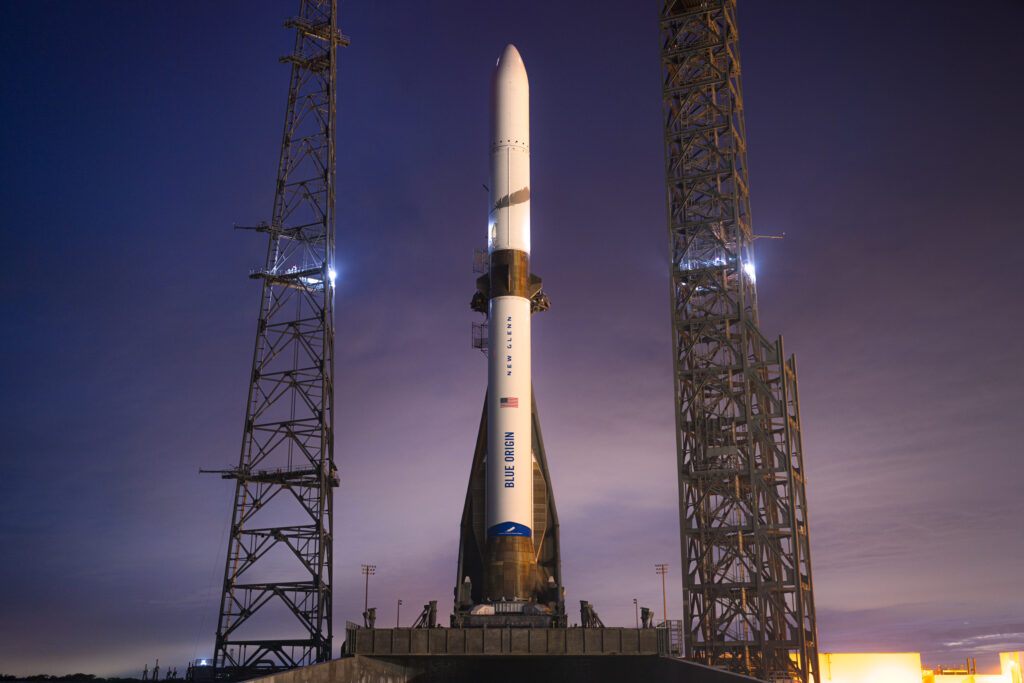Blue Origin’s New Glenn Rocket
A new chapter in commercial space exploration is set to unfold as Blue Origin, the space venture founded by Amazon billionaire Jeff Bezos nearly 25 years ago, prepares for its most ambitious mission yet. The company’s New Glenn rocket is poised for its inaugural launch, marking a significant milestone that could reshape the competitive dynamics of the commercial space sector. Scheduled to take off as early as 1 a.m. EST on Monday/13/2025 from Cape Canaveral Space Force Station in Florida, this launch represents not just a technological achievement but also a strategic move to challenge SpaceX’s dominance in the industry.
The Reason Behind the Delay of Blue Origin’s New Glenn Rocket
Blue Origin’s debut launch of the New Glenn rocket has been postponed due to ice buildup in its critical plumbing systems. Originally scheduled for Tuesday, the launch faces additional potential delays due to unfavorable weather conditions. The forecast at Cape Canaveral Space Force Station in Florida predicts thick clouds and strong winds. Named after astronaut John Glenn, the massive rocket is significantly larger than Blue Origin’s New Shepard and marks a major step in the company’s competition with SpaceX in the space industry. Founded by Amazon CEO Jeff Bezos, Blue Origin plans to attempt the launch again once conditions improve.

What is New Glenn: A Technological Marvel
The New Glenn rocket stands as a towering testament to Blue Origin’s engineering prowess. Named after John Glenn, the first American astronaut to orbit Earth, the rocket measures an impressive 320 feet in height—the equivalent of a 32-story building. It is categorized as a heavy-lift launch vehicle, designed to carry substantial payloads into orbit. With seven BE-4 engines powering its first-stage booster, New Glenn boasts more than twice the power of SpaceX’s workhorse Falcon 9 rocket during liftoff.
The mission, dubbed NG-1, will carry a Blue Origin-built demonstration payload, the Blue Ring Pathfinder, to orbit. This uncrewed mission aims to test the rocket’s capabilities and pave the way for future commercial and governmental launches.
Mission Details and What to Expect
During its inaugural flight, New Glenn’s BE-4 engines will ignite to propel the rocket through Earth’s atmosphere. Shortly after liftoff, the first-stage booster will separate from the upper stage, which houses the payload. The upper stage, equipped with engines optimized for space conditions, will propel the rocket to orbital speeds of approximately 17,500 miles per hour—23 times the speed of sound.
Meanwhile, the first-stage booster will attempt a controlled descent to a drone ship named Jacklyn, stationed about 620 miles downrange in the Atlantic Ocean. This maneuver, involving fins, strakes, and the re-ignition of engines for a soft landing, is a first for Blue Origin. If successful, it will demonstrate the company’s capability to refurbish and reuse rocket components, a cost-saving practice pioneered by SpaceX.
The mission’s upper stage will carry the Blue Ring Pathfinder payload into orbit. However, no satellite deployment is planned for this flight; the payload will remain attached to the upper stage for the six-hour mission duration.
Stakes and Challenges
The stakes for Blue Origin could not be higher. A successful launch and orbital insertion would position the company as a formidable competitor in the commercial launch market. However, this mission is fraught with challenges. Any malfunction during the flight could result in a mission-ending failure. Even the booster’s recovery, while not critical to mission success, is a complex task that Blue Origin has yet to master.
The company has conducted limited full-scale tests of the New Glenn rocket, with the longest ground test lasting just 24 seconds. For this mission, the BE-4 engines will need to sustain performance for much longer to defy Earth’s gravity and achieve orbit. Additionally, the booster’s landing on a moving platform at sea introduces another layer of difficulty.
Blue Origin vs. SpaceX: A High-Stakes Rivalry
Blue Origin’s cautious development approach contrasts sharply with SpaceX’s “fail fast, learn fast” philosophy. While SpaceX has achieved a dominant position in the commercial space sector, Blue Origin’s entry with New Glenn aims to offer much-needed competition.
Physically, New Glenn dwarfs SpaceX’s Falcon 9 and rivals its more powerful sibling, Falcon Heavy. With a wider payload fairing, New Glenn can accommodate larger and heavier cargo, equivalent to 20 moving trucks. This capability positions Blue Origin to capture a significant share of the heavy-lift market, which has grown in importance as satellites and payloads have become larger and more sophisticated.
Moreover, Blue Origin has already secured key contracts, including a NASA mission to launch two Mars probes and the deployment of its Project Kuiper satellite constellation. These developments underscore the company’s ambition to rival SpaceX’s Starlink and solidify its role as a major player in space exploration and commercialization.
The Future of Commercial Spaceflight
If New Glenn succeeds, it could revolutionize the launch market. According to Caleb Henry, director of research at Quilty Space, the heavy-lift segment has become increasingly critical. Decades ago, small rockets were anticipated to dominate the market, but operators have shifted toward larger vehicles for cost and efficiency reasons. “Getting more up in a single mission is faster and more economical than launching one or two satellites at a time,” Henry explained.
Beyond its commercial aspirations, Blue Origin’s long-term vision aligns with Bezos’s dream of preserving Earth by shifting heavy industry to space. This philosophy underscores the company’s broader mission of making space accessible and sustainable for future generations.
Looking Ahead to New Horizons
Blue Origin’s New Glenn rocket represents a pivotal moment in the company’s history and a potential turning point in the commercial space industry. While the road to orbit is fraught with challenges, success would position Blue Origin as a serious contender to SpaceX’s dominance and inject fresh competition into the market. Regardless of the outcome, this mission underscores the rapid advancements in space technology and the growing role of private companies in shaping humanity’s future beyond Earth. All eyes are on Cape Canaveral as Blue Origin prepares to launch its bold vision into the cosmos.